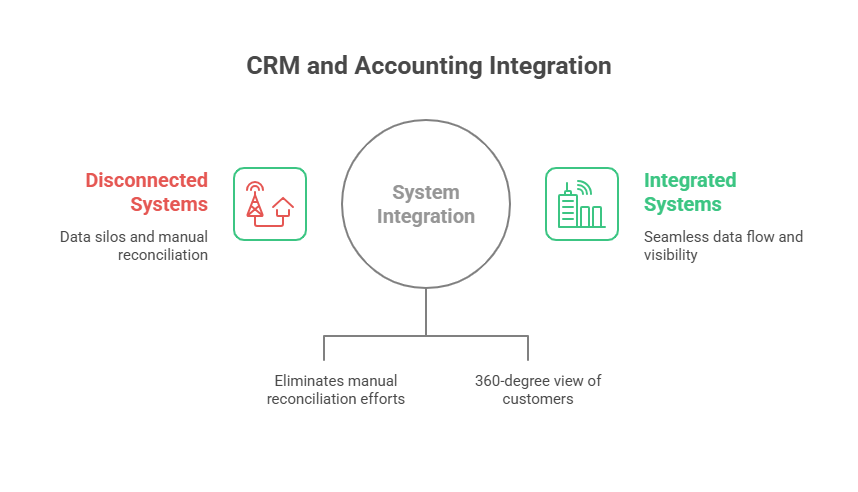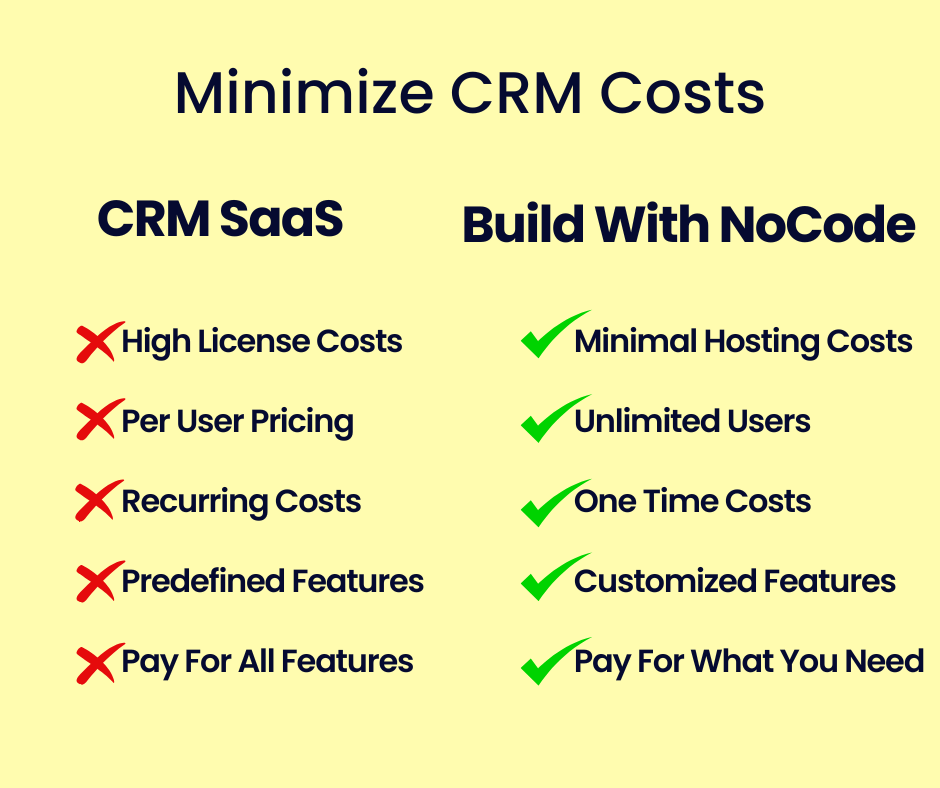Integrating accounting software with home service business CRM can be a game-changer for home service businesses. It streamlines operations, making tasks like invoicing, expense tracking, and payroll easier and more accurate. By having these systems work together, business owners can significantly enhance their operational efficiency.
In this blog post, we'll dive into the many benefits of blending CRM with accounting tools. We'll also tackle common challenges such as manual reconciliation and data silos, and show how integration can overcome these issues. You’ll learn about essential features like invoice syncing, payment tracking, tax calculations, and financial reporting. Popular software options like QuickBooks, FreshBooks, and Sage will also be discussed.
Finally, we will highlight how tools like Fuzen make it possible to create customized integrations without any coding, tailored to the unique needs of your business.
Overcoming Challenges with Integration
When your CRM and accounting systems don’t talk to each other, it creates unnecessary challenges. Let’s take a look at what those problems are—and how integration can solve them.
1. Manual Reconciliation Wastes Time
Without integration, you’re stuck comparing records from two separate systems—manually. This eats up valuable time and opens the door to errors. Even a small mistake can throw off your entire financial report, leading to confusion and potential losses.
2. Data Silos Limit Visibility
Keeping your CRM and accounting data in separate silos blocks you from seeing the full picture. Sales teams don’t know if clients have unpaid invoices. Finance teams don’t have insights into recent customer interactions. This disconnect leads to missed opportunities and inefficiencies across departments.
3. Integration Fixes It All
When you integrate your CRM with accounting software, everything flows together. Data is automatically updated across both platforms, eliminating the need for manual reconciliation. You get consistency, accuracy, and real-time updates without the extra work.
4. Break Down Barriers with a Unified View
Integration removes data silos and gives your team a clear, 360-degree view of both customers and finances. Imagine your support team seeing payment status right inside the CRM, allowing them to offer better service on the spot. That’s the power of connected systems.
Highlighting Essential Features: Accounting Software and Home Service Business CRM Integration
An integrated CRM and accounting system should offer several critical features to optimize your business operations. Let's break down these key functionalities:
1. Invoice Syncing
Invoice syncing is a standout feature. It ensures all invoices are tracked and managed centrally. This eliminates the hassle of switching between systems to check invoice statuses. With everything in one place, you can easily monitor outstanding invoices, reducing the chances of leaving any unpaid.
2. Payment Tracking
Efficient payment tracking is another important aspect. An integrated system provides clear visibility over received and pending payments. This transparency helps businesses maintain healthy cash flow. It ensures that payments are processed on time and reduces the likelihood of payment disputes.
3. Tax Calculations
Simplifying tax compliance is crucial for any business. An integrated system automatically calculates taxes based on transactions recorded in your CRM and accounting software. This feature reduces manual errors and ensures you meet tax obligations accurately and on time.
4. Comprehensive Financial Reporting
Finally, comprehensive financial reporting is essential. By pulling data from both CRM and accounting systems, you get detailed insights into your business’s financial performance. These reports aid in informed decision-making, providing a solid foundation for strategic planning and growth.
In essence, these features work harmoniously to make business management more efficient and less prone to error. They empower home service businesses to stay organized, compliant, and prepared for future growth opportunities.
Exploring Popular Software Options
When it comes to integrating CRM with accounting software, several popular options stand out. Let's take a closer look at QuickBooks, FreshBooks, and Sage, and see what each has to offer.
- QuickBooks
QuickBooks is a well-known choice for many small to medium-sized businesses. It is celebrated for its easy-to-use interface and extensive accounting features. With QuickBooks, you get seamless invoicing, expense tracking, payroll features, and detailed financial reporting. One of its unique benefits is the ability to integrate with a wide range of CRM systems, making it a versatile choice for businesses wanting a robust and flexible solution.
- FreshBooks
FreshBooks is another strong contender, particularly favored by freelancers and small business owners. It stands out for its emphasis on invoicing and billing. The platform offers time tracking, expense management, and a simple way to handle client communications. FreshBooks integrates smoothly with CRM systems to provide easy access to client information and financial data, making it ideal for service-based businesses.
- Sage
Sage offers comprehensive solutions tailored for various business sizes and needs. Known for its powerful accounting features, Sage provides inventory management, financial reporting, and payroll services. Sage's integration capabilities ensure that businesses maintain accurate records while accessing a unified platform for customer and financial management. Sage also offers industry-specific solutions which can be advantageous for businesses needing customized features.
Comparative Analysis
Choosing the right software depends on your business needs. QuickBooks is ideal for those seeking a versatile, feature-rich accounting platform with robust integration options. FreshBooks suits businesses that prioritize easy invoicing and client communication. Sage benefits businesses that require powerful accounting tools with customizable solutions.
Overall, each option presents unique features and benefits, so it's crucial to evaluate your business goals and workflow requirements before making a decision. By selecting the right integration, you can enhance operational efficiency and support business growth.
Building Custom Integrated Workflows with Fuzen
Build an Entire App with AI
Fuzen's standout feature? You can build a complete CRM or business app just by describing it. Using AI, Fuzen takes your input and automatically creates the right workflows, fields, and dashboards—saving you weeks of manual setup.
Customize Everything Without Code
Once your app is up and running, you can customize every feature using a simple, drag-and-drop interface. Whether you're tweaking a workflow, adding automation, or updating forms, Fuzen gives you full control—no coding required.
Start Quickly with CRM Templates
Need a faster launch? Fuzen also offers ready-to-use CRM templates designed for home service businesses. From job tracking and lead management to billing and customer follow-ups, these templates make it easy to get started and scale.
Affordable and Scalable
Unlike traditional CRMs that charge high subscription fees, Fuzen is cost-effective. You only pay for hosting, with no added development costs. And as your business grows, your app can scale effortlessly, with advanced editing tools for when you need more flexibility.
AI + Nocode = Total Flexibility
Fuzen combines the power of AI with the simplicity of nocode tools. You get the best of both worlds: automation that builds the core of your app and tools that let you personalize every detail.
Why Choose Fuzen?
Fuzen helps you break free from rigid software systems. Whether you're integrating CRM with accounting, managing multiple locations, or automating your workflow, Fuzen gives you a flexible, budget-friendly way to build exactly what your business needs, without writing a single line of code.
Conclusion
Integrating CRM and accounting software offers tremendous value for home service businesses. It streamlines operations, improves accuracy, and provides a unified view of your business's financial health and customer interactions. With these integrations, businesses can automate invoicing, effectively manage expenses, and simplify payroll processing, all of which contribute to more efficient and error-free workflows.
As highlighted, tools like Fuzen make it easier than ever to create custom integrations tailored to unique business needs. The platform is a cost-effective solution that eliminates the necessity for expensive software subscriptions while offering robust customization and scalability options powered by AI.
I encourage you to explore Fuzen and see how it can transform your business processes. By crafting integrations that precisely align with your operations, you can enhance efficiency and financial management, setting the stage for sustainable growth and success.

Pushkar is a seasoned SaaS entrepreneur. A graduate from IIT Bombay, Pushkar has been building and scaling SaaS / micro SaaS ventures since early 2010s. When he witnesses the struggle of non technical micro SaaS entrepreneurs first hand, he decided to build Fuzen as a nocode solution to help these micro SaaS builders.



